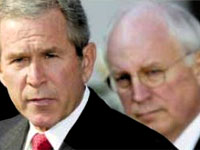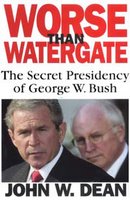Lieutenant General Michael V. Hayden, USAF, former Director of the National Security Agency (NSA), argued that the warrantless spying was necessary to "detect and prevent" potential terrorist acts. He also explained that the NSA is executing a Presidential order deemed to be legal by the US Department of Justice.
The Foreign Intelligence Surveillance Act (FISA) Court has approved 18,742 applications and denied just four between 1979 and 2004. If the communications being intercepted by the NSA is "focused" and "targeted," why is it necessary for the NSA to sidestep obtaining a warrant from FISA for eavesdropping on US citizens?
The answer implied by Hayden, and US Attorney General Gonzales, is that they need to be expeditious. The President can order a search 72 hours prior to obtaining a FISA warrant if urgency is the issue. A more convincing answer seems to be that the President didn't believe he could obtain a warrant from the FISA court, because he could not prove "probable cause," and would thus violate the 4th amendment of the US Constitution.
This was exposed in an exchange between Jonathan Landay with Knight Ridder and General Hayden on January 23, 2006 at the National Press Club. Addressing General Hayden, Landay contended, "You used the terms just a few minutes ago, "We reasonably believe." And a FISA court, my understanding is, would not give you a warrant if you went before them and say "we reasonably believe"; you have to go to the FISA court, or the attorney general has to go to the FISA court and say, "we have probable cause."
Hayden insisted that the burden in the 4th amendment was not "probable cause," but rather a prohibition against "unreasonable search and seizure." Hayden stated, "... if there's any amendment to the Constitution that employees of the National Security Agency are familiar with, it's the Fourth. And it is a reasonableness standard in the Fourth Amendment. And... what you've raised to me is, in terms of quoting the Fourth Amendment, is an issue of the Constitution. The constitutional standard is "reasonable." See the Full Exchange
Fourth Amendment: "The right of the people to be secure in their persons, houses, papers, and effects, against unreasonable searches and seizures, shall not be violated, and no Warrants shall issue, but upon probable cause, supported by Oath or affirmation, and particularly describing the place to be searched, and the persons or things to be seized."
January 24, 2006
January 16, 2006
Baltimore Neighborhood Proposal to Limit Corporate Power
Residents of the Baltimore City neighborhood have proposed limiting the entry of large corporate franchises. According to the Baltimore Sun, this initiative has been led by Benn Ray, the owner of Atomic Books located on 36th Street in Hampden (The Avenue). Sun Article
Some people have interpreted this proposal to be "elitist," as reflected in a letter to the editor of the Baltimore Sun
Opposing Letter to the Sun They seem to envision chic towns, like Carmel California, which have passed similar laws. According to the Jan. 3, 2006 Sun article, the initiative is backed in concept by Mary Pat Clarke, in legislation regarding "formula businesses."
However, this desire to limit franchises has been championed in places around the country for reasons other than preserving the look and feel of trendy places like Carmel, California. This alternative motivation is that of resisting the growth of corporate power and influence on our culture. One of the leaders in this has been the community of Arcada California, led by a group called Democracy Unlimited of Humboldt County. Highly Recommended Link
Below is a letter to the Baltimore Sun on this subject, which expresses concerns about excessive corporate power.
I can understand how some might believe that the sole motivation for preventing franchises from locating to Hamden is "elitist" ("Hampden elitists unfairly limit trade," Jan. 9, and "Hampden strives to preserve its style," Jan. 3). However, there is another motivation for the legislation that would limit large corporate franchises in Hampden. That is the undeniable need to curtail the excessive power that has been amassed by corporate entities beginning in the mid 1800s.
This concern regarding corporate power might also sound "elitist." However, an honest appraisal reveals that, for generations, the true elite of society are those who have used corporations to amass wealth. This consolidated wealth has, in turn, been used to influence the creation of laws and judicial decisions that have conveyed even greater power to corporations. The classic example occurred in 1877, during the corrupt Robber Baron railroad era, when the corporate elite managed to have corporations recognized by the US Supreme Court as "persons" under the 14th Amendment of the Constitution.
After generations of repeating this cycle of using corporate-generated wealth to game the democratic system, corporate persons have accumulated far more power than persons of flesh and blood. The corporate "person" is immortal and amoral (profit motive is independent of moral choices). A single corporation can operate in multiple places on the globe at all times through legions of lawyers, lobbyists, researchers and truly elite executives. Corporations can hammer away tirelessly at their desired goals, which are often contrary to the desires of human goals, even when the humans are in the majority. This is because it has been found unconstitutional to "discriminate" against a corporate "person".
I support shifting the balance of power back in favor of the human person, away from the corporate person. To the tiny degree that the proposed legislation helps accomplish this, I view it as a positive step in the ongoing multi-generational struggle for humans to regain control over excessive corporate power.
END
Some people have interpreted this proposal to be "elitist," as reflected in a letter to the editor of the Baltimore Sun
Opposing Letter to the Sun They seem to envision chic towns, like Carmel California, which have passed similar laws. According to the Jan. 3, 2006 Sun article, the initiative is backed in concept by Mary Pat Clarke, in legislation regarding "formula businesses."
However, this desire to limit franchises has been championed in places around the country for reasons other than preserving the look and feel of trendy places like Carmel, California. This alternative motivation is that of resisting the growth of corporate power and influence on our culture. One of the leaders in this has been the community of Arcada California, led by a group called Democracy Unlimited of Humboldt County. Highly Recommended Link
Below is a letter to the Baltimore Sun on this subject, which expresses concerns about excessive corporate power.
I can understand how some might believe that the sole motivation for preventing franchises from locating to Hamden is "elitist" ("Hampden elitists unfairly limit trade," Jan. 9, and "Hampden strives to preserve its style," Jan. 3). However, there is another motivation for the legislation that would limit large corporate franchises in Hampden. That is the undeniable need to curtail the excessive power that has been amassed by corporate entities beginning in the mid 1800s.
This concern regarding corporate power might also sound "elitist." However, an honest appraisal reveals that, for generations, the true elite of society are those who have used corporations to amass wealth. This consolidated wealth has, in turn, been used to influence the creation of laws and judicial decisions that have conveyed even greater power to corporations. The classic example occurred in 1877, during the corrupt Robber Baron railroad era, when the corporate elite managed to have corporations recognized by the US Supreme Court as "persons" under the 14th Amendment of the Constitution.
After generations of repeating this cycle of using corporate-generated wealth to game the democratic system, corporate persons have accumulated far more power than persons of flesh and blood. The corporate "person" is immortal and amoral (profit motive is independent of moral choices). A single corporation can operate in multiple places on the globe at all times through legions of lawyers, lobbyists, researchers and truly elite executives. Corporations can hammer away tirelessly at their desired goals, which are often contrary to the desires of human goals, even when the humans are in the majority. This is because it has been found unconstitutional to "discriminate" against a corporate "person".
I support shifting the balance of power back in favor of the human person, away from the corporate person. To the tiny degree that the proposed legislation helps accomplish this, I view it as a positive step in the ongoing multi-generational struggle for humans to regain control over excessive corporate power.
END
January 15, 2006
Revolutionary Power

The Introduction to Paul Krugman's book, "The Great Unraveling" calls for a paradigm shift in how we look at today's World. That's because his reality has been shaken, and he shares his spine chilling revelation with us all.
Krugman, a Princeton economist, was offered a gig to write an opinion column in the New York Times. International financial crises were one of his specialties. When he took the Op-Ed job in 1999, he thought he would "write about the vagaries of the new economy, the impacts of globalization, and bad policies of other countries."
"But as events unfolded, politics inevitably intruded." Krugman eventually found himself "speaking very uncomfortable truth to power." "I began pointing out the outrageous dishonesty of the Bush administration." Krugman's book chronicles his commentaries on an unsettling pattern of abuse of power by the Bush administration.
As Krugman's book was about to go to press, someone brought Henry Kissinger's 1957 doctoral dissertation to his attention. Having the experience of critiquing the Bush administration in detail for several years, Krugman read a passage in Kissinger's dissertation "that sent chills down [his] spine, because they seemed all too relevant to current events." The passage describes how the general population responds to a "revolutionary power" that is taking over "a heretofore stable diplomatic system":
Kissinger wrote, "Lulled by a period of stability which had seemed permanent, they find it nearly impossible to take at face value the assertion of the revolutionary power that it means to smash the existing framework. The defenders of the status quo therefore tend to begin by treating the revolutionary power as if its protestations were merely tactical; as if it really accepted the existing legitimacy but overstated its case for bargaining purposes; as if it were motivated by specific grievances to be assuaged by limited concessions. Those who warn against the danger in time are considered alarmist; those who counsel adaptation to circumstances are considered balanced and sane.... But it is the essence of a revolutionary power that it possesses the courage of its convictions, that it is willing, indeed eager, to push its principles to their ultimate conclusion."
It's a case of "The Big Lie."
Krugman gives an example, of this "eager" "conviction," in a response that Supreme Court Justice Antonin Scalia gave to a "student who asked how he felt making the Supreme Court decision that threw the election to Bush. Was it agonizing? Did Scalia worry about the consequences? No: "It was a wonderful feeling," he declared."
Krugman used to be a fairly mainstream thinker until his epiphany that we are presently facing a revolutionary power that intends to undermine the principles and values of the United States. Krugman outlines his "rules for reporting" under these circumstances when the rulers are not playing by the rules:
1. Don't assume that policy proposals make sense in terms of their stated goals.
2. Do some homework to discover the real goals.
3. Don't assume that the usual rules of politics apply.
4. Expect a revolutionary power to respond to criticism by attacking.
5. Don't think that there's a limit to a revolutionary power's objectives (If they nominate a Supreme Court Justice who opposed Roe v Wade, they intend to overturn Roe v Wade).
With Bush in mind, a former director of the Brazilian mint once told me, "It's easier to prevent a dictatorship than it is to remove a dictatorship." He spoke from experience.
Labels:
big,
Henry Kissinger,
lie,
Paul Krugman,
power,
revolutionary
The Big Lie: Are We Living One?
 The predictable response to this question that I might expect from you is, "One? We're living a whole slew of big lies."
The predictable response to this question that I might expect from you is, "One? We're living a whole slew of big lies."That is true; however, I recently had one of those sinking-feeling moments that made me wonder if we're not living an even bigger lie than even the one that lead us into the Iraq war. I'm not talking about the "9/11 Truth" conspiracy, though *shrug* ya never know. I'm talking about rampant criminality being the norm rather than an accepted marginal reality.
True, the US Government has frequently worked with organized crime. When the Government needs information or a favor, and the criminals can provide it, the Government is often willing to "look the other way" in exchange for what it needs. This is routine. There's also the situation in which the Government itself becomes involved in criminal activity, such as transporting drugs to fund black operations. The implied rationale is that the national security benefits of the black operations out weigh the costs of US Government participation in the illegal drug trade. Then, there are even cases in which US officials, or even small units of government, engage in criminality simply for benefit. But it seems today that criminality of a nature that is deeper and more wide spread is going on... I'm not talking about Jack Abramoff, though you start to get an idea of what I'm talking about if you consider this a tip-of-the-arctic example.
Those familiar with organized crime know that "once you get in, you can never get out." The primary reason is that "you know too much" and the syndicate is so powerful, there's no place to hide... and if you can hide, they'll "get" your family. I have that "Invasion-of-the-body-snatchers" feeling, or "Rosemary's Baby" feeling, that things aren't what they seem to be. This hunch is more than a healthy, or unhealthy, dose of paranoia.
I'm getting the feeling that some people within US government are being forced to "choose sides," and that many are choosing the criminal side who they predict will come out winners. Many others are in denial, and simply staying quite. A few are speaking out. Unfortunately, because the few speaking out face "The Big Lie," their voices are going unheeded by the vast majority of the American public continue to slumber in denial.
According to Wikipedia, Hitler wrote in his 1925 autobiography Mein Kampf (James Murphy translation, page 134): "... in the big lie there is always a certain force of credibility; because the broad masses of a nation are always more easily corrupted in the deeper strata of their emotional nature than consciously or voluntarily; and thus in the primitive simplicity of their minds they more readily fall victims to the big lie than the small lie, since they themselves often tell small lies in little matters but would be ashamed to resort to large-scale falsehoods. It would never come into their heads to fabricate colossal untruths, and they would not believe that others could have the impudence to distort the truth so infamously. Even though the facts which prove this to be so may be brought clearly to their minds, they will still doubt and waver and will continue to think that there may be some other explanation."
So, "what," you ask, "is this big lie."? We see is a pattern of actions, all predicated on "protecting the National Security," that is more akin to a group of people seeking to accumulate wealth, control and power in the face of an oncoming global debacle. They believe that law of the jungle is creeping up upon World. They have a mentality like that of the survivalists who create a horde of canned goods and dig fallout shelters. They have access to "intelligence," so they "know more" than many of us mere mortals. They mouth words of "freedom" and "democracy," some even believing that they are being true to those ideals, while their actions expose them as frauds at best and more likely as fascists. Ironically, many would honestly not view themselves as fascists, in part, because they have not taken the time to learn much about fascism. In this case, the lie is so big, they themselves are living a delusion, not realizing they are wrapped in the lie. Many also wrap themselves in the American flag.
This must all sound very nebulous to you, the reader. If you want a better feel for this hunch, read the following:
1. The Introduction to "The Great Unraveling," by Princeton economist Paul Krugman. See my blog piece on "A Revolutionary Power" for the gist.
2. "Confessions of an Economic Hit Man," by John Perkins.
Interview Link

3. "Worse than Watergate: The Secret presidency of George W. Bush" by John Dean, former counsel to President Richard Nixon. My hunch is that it's worse than "worse than watergate".

4. "An Inconvenient Patriot," David Rose, Vanity Fair, September, 2005. Tells the strange tale of how former FBI translator Sibel Edmonds came to know "too much," and describes similar tales about BFI intelligence-operations specialist John Cole, FBI counter terrorism specialist Mike German, Russ Tice who worked for both the Defense Intelligence Agency and the National Security Agency. All of these people discovered "strange things" happening in their agencies, and when they tried to get to the bottom of it, they were set up and fired.

"She [Sibel Edmonds] is credible, and the reason I feel she's very credible is because people within the FBI have corroborated a lot of her story." US Senator Charles Grassley (R) Iowa.
Sibel Edmonds Article Link
January 2, 2006
Consolidation of Pentagon Power
2005 ended a year in which the Bush Administration continued to consolidate power. The cabinet was re-shuffled to move Bush loyalist Condoleezza Rice into the State Department. Alberto Gonzoles, brought by Bush from Texas, advances from the role of White House Counsel and architect of Bush's torture policies, to head of the Nation's Justice Department. The list goes on.

One name on the list of loyalists who are being brought into the tightening circle around Bush is not a household word. That is Defense Undersecretary for Intelligence Stephen A. Cambone. US Brigadier General Janis Karpinski, former Commander of the Abu Ghraib prison, believes he "orchestrated" the policies on US use of torture [1].
Cambone has been brought closer to Bush's political control by a Presidential Executive Order that changes the Pentagon chain of command in the event of an "emergency." This executive order moves the Pentagon intelligence chief into the No. 3 spot in the succession hierarchy; moved down the list are the heads of the Army, Navy, and Air Force.
The "plan moves to near the top three undersecretaries who are Rumsfeld loyalists and who previously worked for Vice President Dick Cheney when he was defense secretary" according to the Dec. 29, 2005 AP article.
Full Article Link
Even conservatives are unnerved by the consolidation of power represented by this move. According to the AP article, 'Thomas Donnelly, a defense expert with the American Enterprise Institute, said the changes make it easier for the administration to assert political control and could lead to more narrow-minded decisions.'
"It continues to devalue the services as institutions," said Donnelly, saying it will centralize power.'
[1] "The Signal" interview with Janis Karpinski, July 4, 2004.
Full Interview Link Interview Excerpt Below:
Signal: Who is — who are the responsible parties for the prisoner abuse at Abu Ghraib?
Karpinski: I don't know. I could tell you that — you want my opinion?
Signal: Yes.
Karpinski: General Miller. [architect of Guantanamo Bay interrogation program, which he transferred to Iraq]; General Fast. [responsible for intelligence in Iraq]; General Sanchez. (Defense Undersecretary Stephen A.) Cambone. I don't know if it stops at Cambone, but I believe that he was orchestrating it, he was directing.
She also took blame herself for not speaking out loudly enough.

One name on the list of loyalists who are being brought into the tightening circle around Bush is not a household word. That is Defense Undersecretary for Intelligence Stephen A. Cambone. US Brigadier General Janis Karpinski, former Commander of the Abu Ghraib prison, believes he "orchestrated" the policies on US use of torture [1].
Cambone has been brought closer to Bush's political control by a Presidential Executive Order that changes the Pentagon chain of command in the event of an "emergency." This executive order moves the Pentagon intelligence chief into the No. 3 spot in the succession hierarchy; moved down the list are the heads of the Army, Navy, and Air Force.
The "plan moves to near the top three undersecretaries who are Rumsfeld loyalists and who previously worked for Vice President Dick Cheney when he was defense secretary" according to the Dec. 29, 2005 AP article.
Full Article Link
Even conservatives are unnerved by the consolidation of power represented by this move. According to the AP article, 'Thomas Donnelly, a defense expert with the American Enterprise Institute, said the changes make it easier for the administration to assert political control and could lead to more narrow-minded decisions.'
"It continues to devalue the services as institutions," said Donnelly, saying it will centralize power.'
[1] "The Signal" interview with Janis Karpinski, July 4, 2004.
Full Interview Link Interview Excerpt Below:
Signal: Who is — who are the responsible parties for the prisoner abuse at Abu Ghraib?
Karpinski: I don't know. I could tell you that — you want my opinion?
Signal: Yes.
Karpinski: General Miller. [architect of Guantanamo Bay interrogation program, which he transferred to Iraq]; General Fast. [responsible for intelligence in Iraq]; General Sanchez. (Defense Undersecretary Stephen A.) Cambone. I don't know if it stops at Cambone, but I believe that he was orchestrating it, he was directing.
She also took blame herself for not speaking out loudly enough.
Subscribe to:
Comments (Atom)


